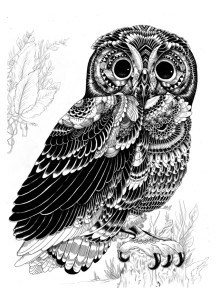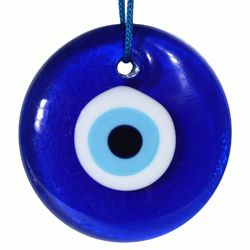Malocchio and Other Italian Superstitions
Posted on October 3rd, 2013 by Anna in Uncategorized | No Comments »
A few years ago I went to spend New Year’s Eve up in Brooklyn with the Italian-American family of a guy I was dating. Without a doubt they threw a terrific party; there were guitars and mandolins and wine aplenty and getting kissed and loudly proclaimed over by a swarm of relatives the instant they met me. The food was plentiful, diverse, and delicious, all of which had been lovingly and laboriously conjured into being by the guy’s nonna. Nonna was a four-foot, black-clad Sicilian émigré, terrifying and formidable, who when we were introduced surreptitiously patted my stomach to gauge whether I was pregnant with her grandchild. She spoke no English and I spoke no Italian, but at midnight she personally served me a bowl of lentils and conveyed to me that these lentils were a dish special to her hometown, that it was an old Sicilian belief that to eat lentils on New Year’s Day brought good luck for the rest of the year.
Italy has a rich supply of such superstitions, many of them, not surprisingly, having to do with food. The age-old tradition of throwing spilled salt over your left shoulder to ward off bad luck still thrives in Italy, dating back to the days when salt was a precious commodity and wasting it was deemed a sin. A bulk of Italian food superstitions, as do many of their other traditions, deal with bread. Bread, being a symbol of Jesus as well as a staple of Italian cuisine, must be treated with the utmost respect: never lay a loaf of bread upside-down, never stick a knife into a loaf of bread (unless you’re cutting it,) and never, ever throw a loaf of bread away. If you absolutely must do so, kiss it first, just to be safe. And spilling wine, of course, is the height of bad luck, which one can remedy by dabbing a drop of the spilled wine behind each ear.
Like those in most European cultures, especially Greece and Eastern Europe, the superstitious in Italy live in dread of being cursed by malocchio, the Evil Eye. Malocchio can be sent to you from anyone and is basically evil-wishing fueled by envy—Dante describes it in Purgatorio, his less sensational sequel to Inferno, as “My blood was so afire with envy that/ when I had seen a man becoming happy,/ the lividness in me was plain to see.” Malocchio can manifest itself as physical ailments or complaints or as a streak of bad luck, and the eyeball-shaped charm against the Evil Eye is ubiquitous in Mediterranean regions.
Many Italians believe that owls are harbingers of bad luck, and that to lay a hat or shoes on a bed is to invite death to come around. The number 17 is unlucky, but apparently to dream of the number 29 is a sign that you will win the lottery. (Italians take dream interpretation very seriously, with most dreams seeming to translate into prophecies of doom.) If you sweep a broom over someone’s feet or sit at the corner of a table, that is a sure sign you’ll never marry. Cutting your nails on a Thursday will surely invite evil spirits, but storing a knife under your mattress or spitting can keep them at bay. And, of course, the saints are always handy to have around, with each saint dealing with a particular aspect of life. For example, a prayer to St. Anthony will help you find lost objects (so my mother always told me,) whereas the parents of an unmarried daughter who’s hit forty may pray to St. Jude—the patron saint of lost causes.
As science and technology advances, drawing us away from superstitions, which are generally viewed as being backwards and old-fashioned, it’s refreshing to know there are places where such customs and traditions are still thriving. And after all, what harm is there is making sure all elephant statues always face south, or that peacock feathers (symbolizing the Devil’s eyes,) never enter the house? After all, you never know…






